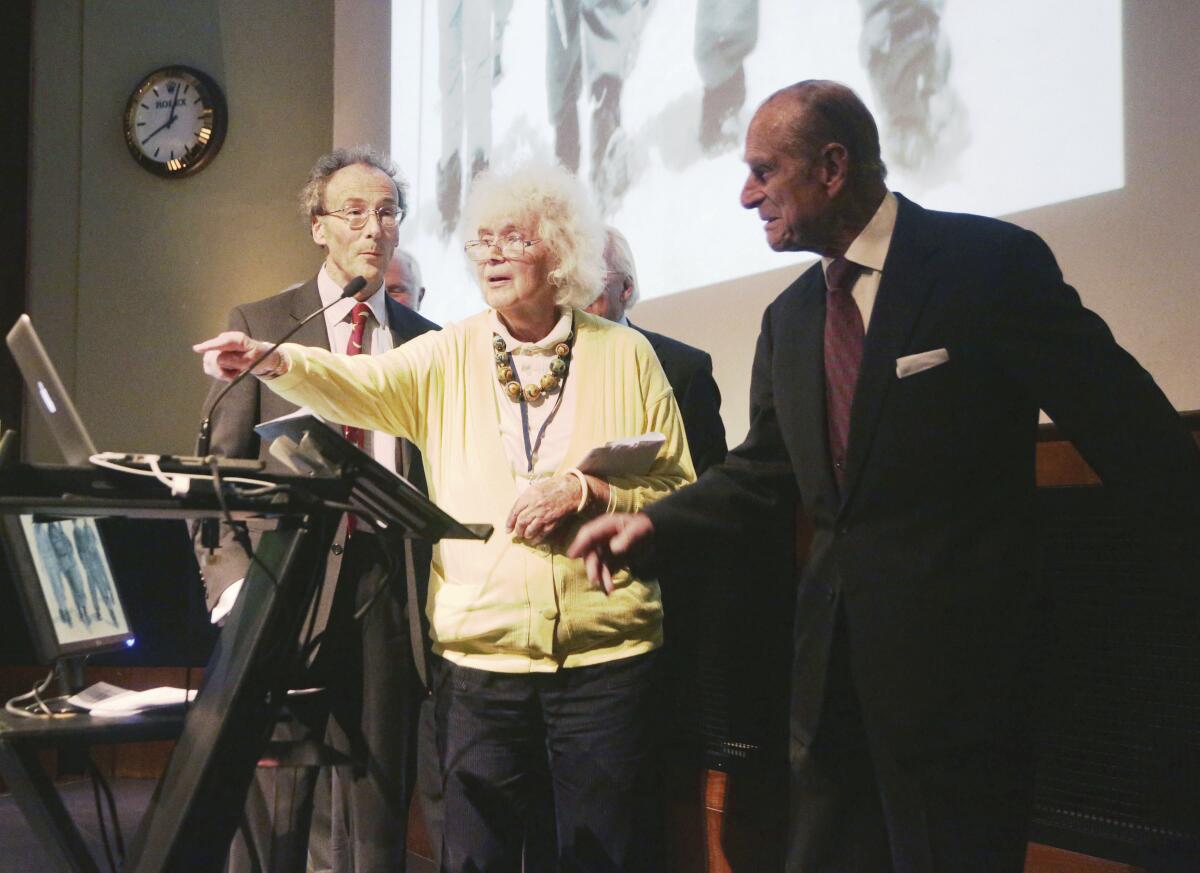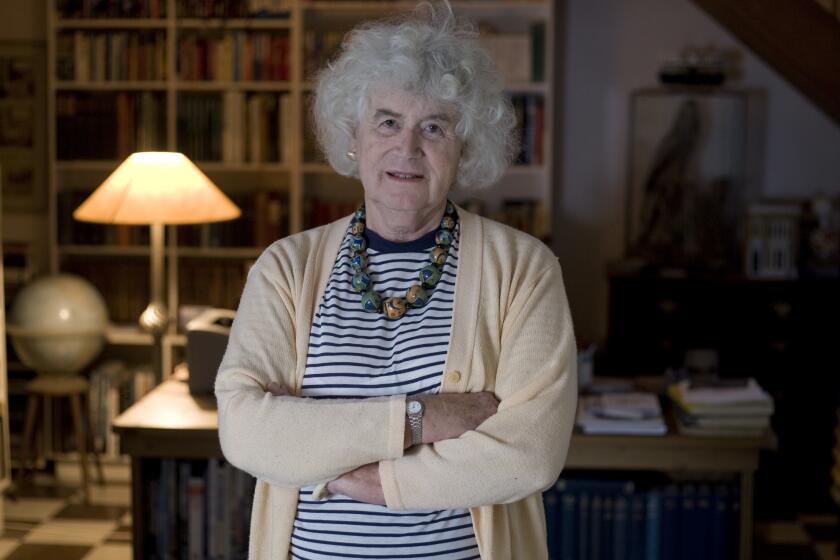Jan Morris perfectly captured the world — and Los Angeles too

Appreciation
Jan Morris
If you buy books linked on our site, The Times may earn a commission from Bookshop.org, whose fees support independent bookstores.
Jan Morris, the Welsh journalist and travel writer who died Friday at age 94, is perhaps best known for the 1974 memoir “Conundrum,” which chronicled her decision to undergo gender reassignment surgery. For me, however, the author — who was born and spent the first 46 years of her life as James Morris — should also be remembered for having written one of the finest essays about Los Angeles.
Morris’ “Los Angeles: The Know-How City” was published in Rolling Stone in 1976 and collected in her 1980 book of travel essays, “Destinations.” (I reprinted it in “Writing Los Angeles: A Literary Anthology.”) It is insightful and incisive, getting at some fundamental, if often overlooked, truths about the place.
“[T]his city,” she writes, “genuinely springs out of its own soil, possesses a true genius loci and forms a kind of irreplaceable flashpoint: the point on the map where the intellectual, the physical and the historical forces of American history met to produce — well, combustion, what else?”
When Morris uses the word “combustion,” she is referring, of course, to the automobile. But she has no interest in the tired tropes by which car culture becomes emblematic of our superficiality. Instead, Morris is reflecting on the authenticity of a city that knows itself. Such a sensibility sits at the center of “The Know-How City”: Los Angeles as unpretentious, defined by “solid, old-fashioned, plain hard work.”
I’ve long thought about Los Angeles this way as well.
Christine Lennon, Su Wu and others contribute essays to a collection on the master essayist
Ours is a city that sits atop a bowl of sand and tar striated with fault lines, in a wildfire ecology prone to drought. We persist here as an act of will. Just consider the freeways or the aqueduct — massive infrastructure projects requiring expertise and vision — or the grips and carpenters and electricians on a film set, without whom the so-called dream factory could not exist.
“All the mechanisms of Los Angeles,” Morris enthuses, “are like apprentices to these matters: the robot lights and the TV cameras, the scudding helicopters, the laboring oil pumps bowed like slaves across the city, or the great telescopes of Mt. Wilson, brooding among their conifers high above the city, which in the years before the Second World War more than doubled man’s total knowledge of our physical universe.”
Los Angeles, in other words, is the product of intention. Los Angeles is a grand accomplishment. The irony is that a visitor, of all people, should perceive this; it’s a quality outsiders generally miss. But then, this is what we want from a travel writer — the acuity of the fresh eye — and Morris possessed it in glorious profusion. In “The Know-How City,” she describes the city as it is, not as it is often misperceived: a landscape of invention as opposed to reinvention, in which we can work to grow into ourselves.
Something similar might be said of Morris, whose life and career represented a testament to that idea. She served as an intelligence officer in World War II and reported for the Times of London on Edmund Hilary’s ascent of Mt. Everest in 1953. Through it all, she confided in her wife about her gender dysphoria, which she had experienced from an early age. “I was three or perhaps four years old,” she writes in the astonishing opening paragraph of “Conundrum,” “when I realized that I had been born into the wrong body, and should really be a girl. I remember the moment well, and it is the earliest memory of my life.”
“Conundrum” was how I came to know about Morris; it was the first transgender narrative I read. In the early 1970s, it was a revolutionary statement, although, as she readily acknowledged, Morris was herself no revolutionary. “My loves remain the same loves,” she wrote in the preface to a 2001 reissue of her memoir, “my family, my work, a friend or two, my books and my animals, my house between the mountains and the sea.” What she’s describing is a continuity of spirit, the persistence of humanity.
Jan Morris, the celebrated journalist, historian, world traveler and fiction writer who became a pioneer of the transgender movement, has died at 94.
It is this, I want to suggest, that made Morris such a remarkable writer — not only her powers of observation but also her empathy. She was drawn to people as well as to places, or perhaps it is most accurate to say that she understood place through the filter of identity. “I am not the first to associate the city with nowhereness,” she once wrote of Trieste. “… Those who know it better often seem to see it figuratively, not just as a city but as an idea of a city, and it appears to have a particular influence upon those of us with a weakness for allegory.”
That’s a marvelous bit of prose, moving deftly from the metaphorical to the personal. Key to it is that phrase “those of us,” by which Morris both makes clear her own allegiances and also asks the reader to join her. Something similar unfolds in “The Know-How City,” which in its final pages turns from appreciation to something more complex.
“And unexpectedly,” she tells us, “when I examine my feelings about this tremendous and always astonishing city, I find them inextricably shot through with regret. This is not, I think, a usual reaction to Los Angeles, and I am moved to it partly because I come from a temporarily discomfited civilization myself.”
Morris had that right. Los Angeles is temporarily discomfited. But the same, she understood, is also true of every place. Every place, yes, and every person, all of us in a constant process of becoming. This was the state out of which Morris lived and wrote, “[t]hrough apparent chaos to unmistakable authority.”
Welsh writer Jan Morris died Friday at 94. Christopher Reynolds recalls a charming lunch in Wales with the witty, learned and enthusiastic traveler.
Ulin is a former book editor and book critic of The Times.
More to Read
Sign up for our Book Club newsletter
Get the latest news, events and more from the Los Angeles Times Book Club, and help us get L.A. reading and talking.
You may occasionally receive promotional content from the Los Angeles Times.







